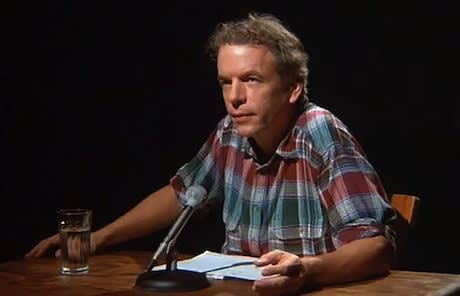The conceit is a challenging one for those with short attention spans. Esteemed monologist Spalding Gray walks into a packed venue, sits down at a desk with nothing more than a McDonald's notebook and a microphone in front of him and proceeds to talk for the next 85 minutes. Waxing in his inimitable manner on his role in the film The Killing Fields, the history of genocide in Cambodia and any number of indulgences and digressions naturally stemming from these topics, the result is audaciously captivating. With help from director Jonathan Demme (The Silence of the Lambs) and a creative team of some of the film industry's best, what would appear on paper to be little more than a filmed stage show has been accentuated with carefully placed lighting cues, sound effects and music. Against a backdrop of a cloud-filled sky and occasionally referring to a map pulled down from above, Gray first explains the fortuitous meetings that led to him being cast in Roland Joffe's 1984 film in a supporting role despite having little acting experience. From there, he goes on to describe the experience of being on-set in Bangkok, from the unavoidable allure of sampling Thailand's powerful marijuana to the affordable and somewhat depressing varieties of prostitution available to pleasure-seekers. This is especially jarring when he juxtaposes these tales with the real-life events that inspired The Killing Fields, a horrific passage in history that resulted from America turning a blind eye to the brutal actions of the Khmer Rouge while they massacred millions of people. Gray is a naturally engaging, funny speaker, using his voice to regularly build to stirring crescendos that are sometimes punctuated with a risible punch line, before leaning in close to the microphone for an intense whisper to start the climb all over again. The only supplemental material included on this release is a new interview with Demme, in which he outlines how he came to be involved with the project, after admiring the work of Gray for quite some time. It would be easy to accuse Demme of being egotistical when he refers to Swimming To Cambodia as a "perfect" film, but he defers praise mostly to Gray and his collaborators. The interview is dedicated to the memory of Gray, with Demme describing how unfairly ironic it was that Gray should live the last years of his life, before committing suicide, in constant pain following a car accident when he brought such joy to other people's lives.
(Shout! Factory)Swimming To Cambodia
Jonathan Demme

BY Kevin ScottPublished May 23, 2013